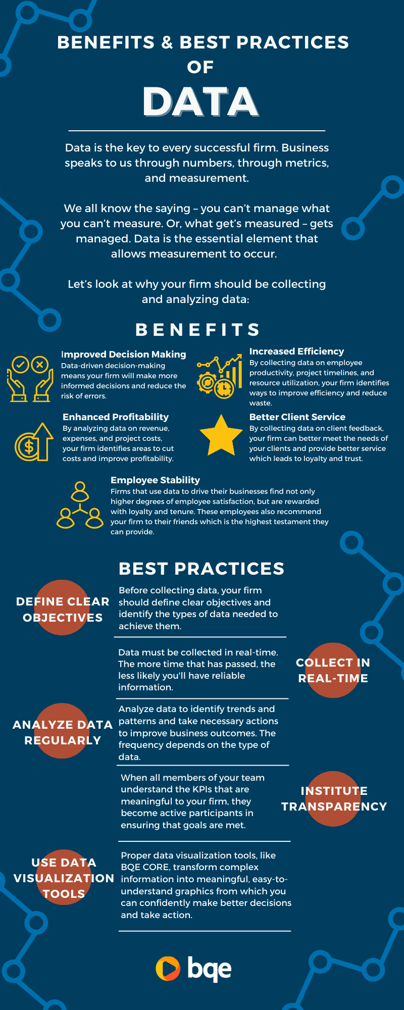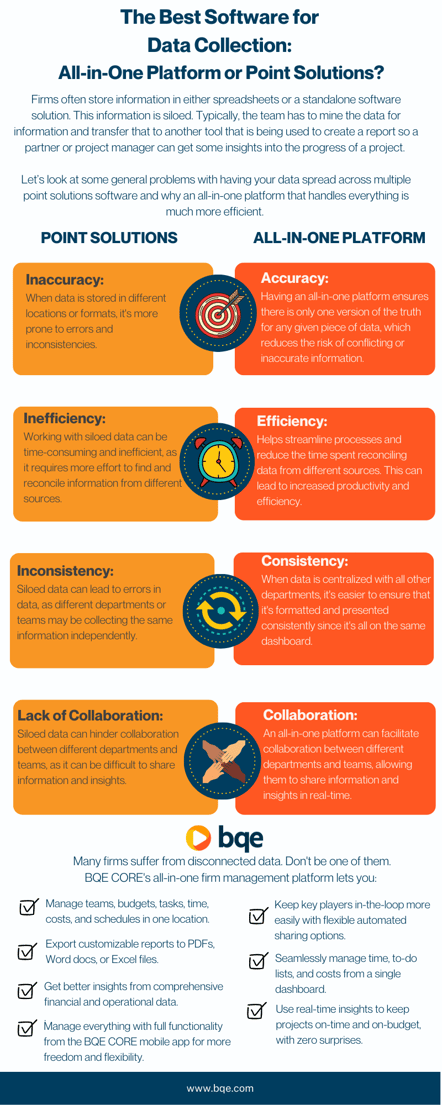Have you ever thought that data has nothing to do with your job? That it’s a distraction from the services you provide? Your design services? If so, you might be missing out on an essential ingredient that can take your firm to the next level. Data is the secret to every successful firm, and it’s the key to unlocking your full potential.
Running a healthy and profitable firm is a serious responsibility, and data is an essential element that allows measurement to occur. Without data, it’s impossible to measure progress, identify areas for improvement, and make informed decisions.
In this blog post, we'll explore why your firm should be collecting and analyzing data, the benefits of data, and best practices for collecting data.
Why Should I Focus on the Data?
.png?width=442&height=442&name=knowledge%20is%20power%20data%20quote%20(1).png)
Identify Areas for Improvement
Collecting data on different aspects of your firm, such as client satisfaction, financial performance, employee productivity, and project outcomes, enables you to identify areas that need improvement and allows you to take the necessary steps to address them. Data provides insights that help you identify and tackle problems before they become bigger issues.
Measure Success
Every firm has goals, and the only way to know if you've achieved them is through data providing the key performance indicators (KPIs) that enable you to measure it. Collecting data allows your firm to track its progress over time and measure your success towards achieving your goals. Data provides the means to quantify your accomplishments and make data-driven decisions.
Make Informed Decisions
By having access to data, your firm can make informed decisions on various business aspects such as resource allocation, project selection, and marketing strategy. Data provides insights that help you make informed decisions based on facts, not just intuition. With data, you can confidently make decisions that lead to better business outcomes.
Stay Competitive
Collecting data on your industry, competitors, and market trends enables the firm to stay competitive and adapt to changes in the market. Data provides insights that help you understand the market dynamics, anticipate trends, and stay ahead of the competition.
Enhance the Employee Experience
Data can also enhance the employee experience by providing real-time information and control over different aspects of their work. By collecting data on employee productivity, job satisfaction, and work environment, your firm can improve the employee experience and foster a more productive and engaged workforce. Plus, this helps overall employee retention, meaning your team stays fully staffed and your projects receive better outcomes.
Benefits of Collecting Data

Let’s look at some of the top benefits of collecting business data:
Improved Decision Making
Data-driven decision-making means your firm will make more informed decisions and reduce the risk of errors.
Increased Efficiency
By collecting data on employee productivity, project timelines, and resource utilization, your firm will identify ways to improve efficiency and reduce waste.
Enhanced Profitability
By analyzing data on revenue, expenses, and project costs, your firm will identify areas to cut costs and improve profitability.
Better Client Service
By collecting data on client preferences, feedback, and satisfaction, your firm can better meet the needs of your clients and provide better service which leads to client loyalty and trust.
Employee Stability
Firms that use data to drive their businesses find not only higher degrees of employee satisfaction but are rewarded with employee loyalty and tenure. These employees also recommend your firm to their friends, which is the highest testament they can provide.
Benchmark Performance
As a firm, you should compare your KPIs to those of other firms. This involves collecting and comparing quantitative data that will help you identify performance gaps. The AIA offers a benchmarking tool for architecture firms. PSMJ also offers a variety of different benchmarking tool options.
What are the Best Practices for Collecting Data?

Let’s look at some of the best practices for collecting business data:
Define Clear Objectives
Before collecting data, your firm should define clear objectives and identify the types of data needed to achieve those objectives.
Collect in Real-Time
Data must be collected in real-time and not fabricated in the future. There is a direct correlation between data truth and the timing of when it was documented. The more time that has passed, the less likely you will have reliable information.
Analyze Data Regularly
To identify trends and patterns and take necessary actions to improve business outcomes you need to analyze data regularly. The frequency depends on the type of data. For instance, if you were a pilot, knowing your airspeed and attitude must be known constantly whereas checking on the cabin temperature or state of the landing gear is less important for most of the trip.
Institute Transparency
This is often hard for firms to appreciate but when all members of your team understand the KPIs that are meaningful to the ownership, understand what they mean, and where they are at all times - only then can they become active participants in ensuring that goals are met.
Use Data Visualization Tools
Having proper data visualization tools transforms complex information into meaningful, easy-to-understand graphics from which you can confidently make better decisions and take action.
Analyze and Collect Data Successfully with BQE CORE
Analyzing and collecting data doesn’t have to be difficult. With the right tools, you can learn to read and use data to your advantage quite easily. BQE CORE is an all-in-one practice management software that easily pulls the data you need through automated features such as project management, time and expense tracking, reporting and analytics, billing and invoicing, and more.
Try a free demo today to start managing your data and see results in your firm’s overall profitability.